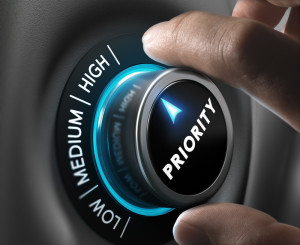You have priority work scheduled on your calendar. You have carved out time when not in meetings to get some work done. Yet urgent issues keep finding their way to your office. Sound familiar?
That’s the life of anyone in management, especially in large complex organizations. And it’s a challenge these days as our new Stony Brook Medicine CIO and I try to get through a three-week transition period. The outline of what I need to cover with her is four pages long. And I keep adding more items.
We are ending week two. By next week, I should be in far fewer meetings as she handles them without me. I should be able to finish my tasks as part of the transition and organize my paper and electronic files to turn over to her. I know she doesn’t like paper, so I’ll be ruthless as I purge and give her only the most important paper files.
We’ve done our best to block out some chunks of time together to get through everything.
But when we sit down together to go over the next block of information, we often end up first dealing with the latest requests and issues. What started as a focused two-hours is suddenly half gone.
What have I learned?
Anyone trying to spend focused time on something must stop checking and answering email. You must stop taking phone calls. Ideally you should get away from your workspace and everyone who might stop by to see you. Our most productive time has been when we work together in the common space at the guest house where we are both staying. It’s been the hour before going to the office. It’s been when we have left early to get another hour together at “home”. And we found it in the luxury of the half day we scheduled at home this morning.
Are we still answering emails at 11PM at night?
Yes.
That is not sustainable, but it is what it takes during this period.
I’ve learned that when you are early in a new position and away from home, the tendency is to work all night. I’ve done it several times in my career. But by the end of that initial period I know that I really need my husband around to get me to shut off work and do something fun.
In summer months, there are less meetings at work; some standing meetings are cancelled because people are on vacation. It’s a “gift of time”. And you think you can catch up on all your email and spend more time on project work you have put off. But to meet that goal, you have to work your plan.
Here are some tips I remind myself to follow:
- Prioritize your work daily and weekly
- Plan your work and make time and space to get it done
- Don’t schedule an hour meeting when 30 minutes is enough; if someone asks for 30 minutes see if you can cover that topic in 15 minutes
- Keep time open on your calendar each day so there is room for those time sensitive issues you didn’t expect
- Don’t be a slave to email
- Remember that email isn’t the only form of communication – if something is urgent, pick up the phone, IM, or send a text
- Schedule time to eat lunch even if it’s at your desk between meetings – you need the energy
- And when you finally go on vacation, shut it all off!
Can you relate? Any tips you’d like to add?
Related posts:
Email overload – does anyone have the answer?

Young on said:
Hi Sue –
I always look always to receiving your blog.
To add to your list:
Weekly – block 15 minutes to 1/2 hour on my calendar for MBW (Mgt by Walking). I walk around the department to get to know my staff or to other departments along with the dept. manager.
Every other week – block at least two hours on my calendar for email or webinar education.
Sue Schade on said:
Young, thanks for the feedback. Great add! MBW or gemba walks always important to make time for.
Ann on said:
I’m mid-management but report to a CEO. As a people-person, he is excellent at being present in one-on-one meetings or calls. But if he needs to complete something on his own, he will allow distractions. So I schedule a time to meet with me via phone to work through our shared projects. If he is on the phone with me, he will shut the door, ignore other callers and actually get the work done.
Sue Schade on said:
Ann, from everything I’ve heard, you have a great collaborative system for working together and focusing on priorities. Kudos!
Micheal Sweet on said:
Hi Sue-
Great tips in this post, many of them that I share with my Staff on a regular basis. The others around email that we encourage are to turn off the new message alert and to post an away message if they need focused time. The new message alert is very distracting for staff and they always jump right on the new messages instead of remaining focused. The away message helps them feel that it’s ok not to respond to messages immediately and gives their contacts and alternate way to reach them for really urgent issues that cannot wait. We have found both to be very effective.
Sue Schade on said:
Micheal, thanks for the feedback and sharing email management tips. Turning off the alert is important one.
Allan Lewis on said:
Good common sense advice Sue, for people at any level.
Sue Schade on said:
Allan, yes, general tips apply broadly. Thanks